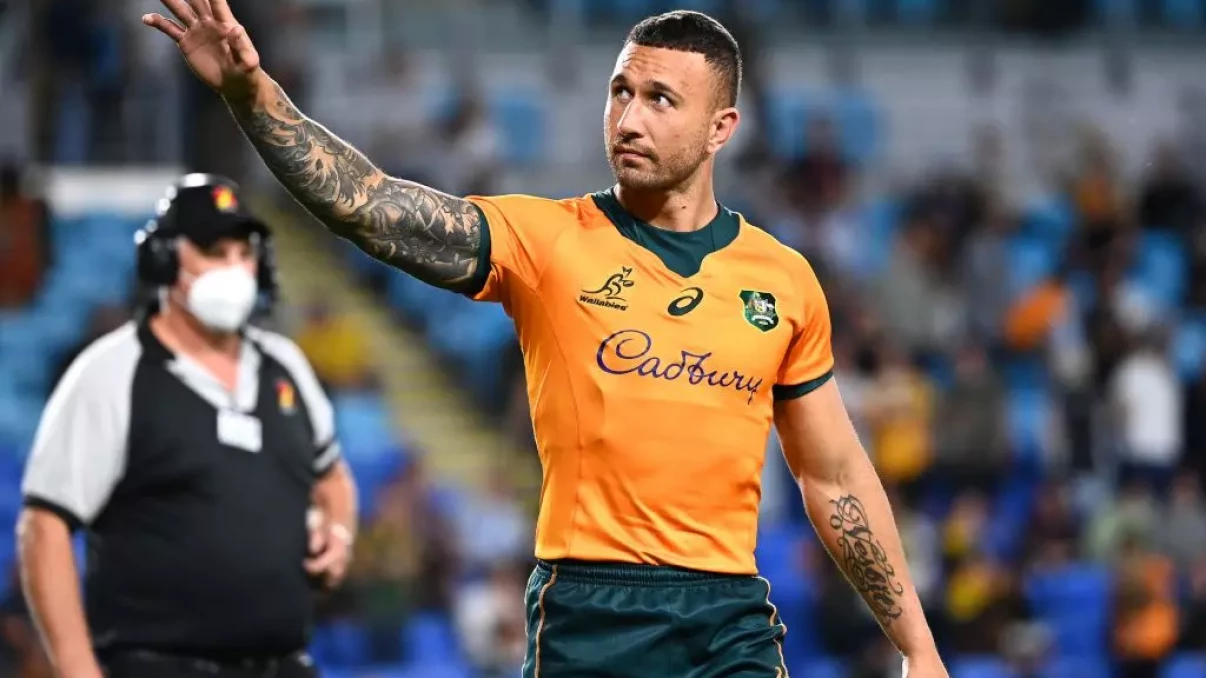Quade Cooper breaks silence on Eddie Jones' World Cup snub, coaching issues
 By
SABC Sport
By
SABC Sport
17th December 2023

Veteran flyhalf Quade Cooper has spoken out about ex-Wallabies head coach Eddie Jones for the first time since he was snubbed for the Rugby World Cup squad.
The 35-year-old playmaker was among the shock omissions from Jones' 33-man squad for the tournament in France, along with Michael Hooper.
When asked to explain his thinking behind his decision, Jones said Cooper, Hooper, and Bernard Foley were not the right role models for the young squad he selected.
"For those guys, I don't think they were the right role models for the team going forward," Jones said just two days before Australia made their first appearance in the tournament.
"Don't get me wrong, they're not bad guys, but you need guys - particularly when you've got a team like Australia has at the moment - you need guys who are obsessed with winning, obsessed with being good, and those three are past those stages."
Australia would go on to produce their worst-ever World Cup performance, failing to progress past the pool stages of the tournament for the first time, losing to Fiji and Wales. Jones has since resigned from his role as head coach and, more recently, was unveiled as the new Japan head coach.
Cooper avoided Jones' calls after being omitted from the Wallabies squad and has now commented on missing the World Cup as well as Jones' tenure.
"To be honest, I just felt I wasn't going to go [to the World Cup]. I just had a sense," Cooper told The Age in an exclusive interview.
"You can read people's energy. Especially in the last four years, my journey has been about development and the process. I have put myself into a place where my worth isn't controlled by wearing a Wallabies jersey. It is a huge honour, though. I wanted the boys to do well, like Carter [Gordon].
"I was quite upset because I felt I couldn't help in any way. I had to sit back and watch things play out in front of me."
While Cooper refrained from criticising Jones heavily throughout the interview, he was critical of the former head coach's staff.
The playmaker spoke highly of Jones' predecessor Dave Rennie, hailing his 'great rugby IQ' and added that his detailed planning gave the squad 'ultimate confidence'.
However, Cooper did not have the same experience during Jones' time in charge.
"That was one of the things I struggled with in these last six months leading into the World Cup was we didn't really have a plan," the Japan-based fly-half explained.
"We had some great communication and talking around the game, but when you go into a game with no real plan or structure and no system, that makes it really difficult as a playmaker. Everybody is looking to each other. Are you going to do that? Am I in that ruck? It was quite tough."
When asked to elaborate, Cooper slammed Jones' decision to add ex-rugby league prop and coach Jason Ryles to his coaching staff as the Wallabies' attack coach.
"Key individuals around Eddie lacked significant expertise. As players, we tried to buy into what he was preaching, as not doing so would paint us as a detriment," he said.
"However, common sense was hard to ignore, and it was remarkable that Rugby Australia couldn't see it. For instance, Jason Ryles, a rugby league prop, served as an attack coach for the Wallabies at a World Cup. How much did he truly know about rugby attack? That encapsulated the situation."
He added: "At the end of the day, he [Jones] wasn't receptive to new ideas, which is why I found it hard to believe he questioned myself, Hoops', and Foles' desire to win. Winning is based on how well you prepare and the ability to execute the small details. Those details, like the decision to opt for a rugby league prop as your rugby union attack coach, put everything into perspective, in my opinion."








